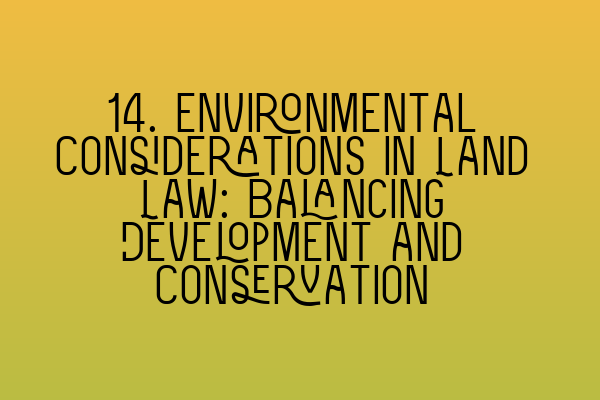Environmental Considerations in Land Law: Balancing Development and Conservation
Introduction
Environmental considerations play a crucial role in land law, as they involve striking a delicate balance between development and conservation. With the increasing global focus on sustainability and environmental protection, it is vital for property lawyers to be well-versed in the environmental implications of land transactions. In this blog post, we will explore the key environmental considerations in land law and discuss how they can be effectively balanced to ensure responsible development while conserving our natural resources.
1. Environmental Impact Assessments (EIA)
One of the fundamental aspects of environmental considerations in land law is the requirement for an Environmental Impact Assessment (EIA) for certain development projects. An EIA is a thorough assessment of the potential environmental effects of a proposed development. It evaluates factors such as air and water quality, biodiversity, noise pollution, and human health impacts. This assessment is essential to ensure that developments are carried out in an environmentally sustainable manner.
2. Biodiversity Conservation
Conserving biodiversity is a critical environmental consideration when it comes to land law. Biodiversity refers to the variety of plant and animal species and their habitats. Protecting biodiversity not only safeguards ecosystems but also contributes to the overall health and balance of the planet. Property lawyers must consider the potential impact of development on local flora and fauna, as well as the legal obligations for protecting designated sites of environmental importance.
3. Sustainable Development
Sustainable development is a concept that aims to meet the needs of the present generation without compromising the ability of future generations to meet their own needs. In land law, sustainable development involves balancing economic growth with social and environmental considerations. Property lawyers should advise clients on incorporating sustainable practices and technologies into their development plans, such as energy-efficient design, use of renewable resources, and waste reduction strategies.
4. Conservation Areas and Listed Buildings
Conservation areas and listed buildings hold special significance in land law due to their historical, architectural, or cultural importance. Balancing development in these areas can be particularly challenging, as they require preserving the character and integrity of the place while accommodating modern requirements. Property lawyers need to navigate the complex legal framework surrounding conservation areas and listed buildings to ensure compliance and protect the heritage value of such sites.
5. Climate Change Adaptation
The growing concerns over climate change necessitate proactive measures to adapt to its impacts. Property lawyers should consider the potential risks and vulnerabilities of a development project to climate change, such as increased flood risks or extreme weather events. By integrating climate change adaptation strategies into land law, we can ensure that developments are resilient and adaptable, reducing future environmental risks.
Conclusion
Environmental considerations in land law are no longer optional but essential for responsible and sustainable development. Property lawyers must embrace their role in balancing development and conservation, taking into account factors such as environmental impact assessments, biodiversity conservation, sustainable development practices, conservation areas and listed buildings, and climate change adaptation. By approaching land transactions with an environmental mindset, we can protect our natural resources, preserve our cultural heritage, and create a better future for all.
For more information and resources on SQE preparation, practice exams, and exam dates, please visit the following links:
– SQE 1 Practice Exam Questions
– SQE 1 Practice Mocks FLK1 FLK2
– SQE 2 Preparation Courses
– SQE 1 Preparation Courses
– SRA SQE Exam Dates
